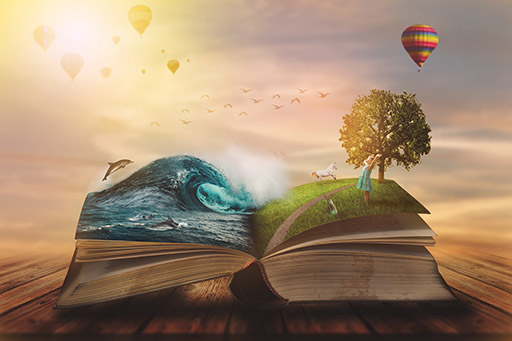7 How did you relate to the story world?
This activity measured the extent to which you felt like you had travelled into the story world. Psychologists call this transportation. Transportation is the extent to which you feel mentally and emotionally immersed in the story world (Sestir and Green, 2010) and can be likened to the sense that you, as a reader, become engrossed (Oliver, Dillard, Bae & Tamul, 2012), like Ford Madox Ford did when reading in his tent at war. Sometimes transportation can happen so strongly that your focus is completely on the story, as in Ford’s case, and you can fail to notice things that are happening in your real environment.
There are several different ways in which psychologists have tried to measure transportation into books, films or television, and the specific set of questions you answered was developed by Sestir and Green in 2010.
The top of the transportation scale is a score of 56 so if you had been completely transported you would have scored 56. The bottom of the scale is a score of 8, so if you scored close to that number it suggests you weren’t very transported into the text at all. Have a look at your own transportation score to give you a sense of the degree to which this activity suggests you were transported into the story world described in the extract. Previous research by Green, Brock and Kaufman (2004) has shown that there is a correlation between how transported into the story someone feels and how much they enjoy the experience of reading. You may wish to reflect on your own transportation score and the degree to which you enjoyed doing the reading. Importantly, it doesn’t seem to matter for enjoyment whether or not the story world you are transported into is a nicer place than the real world, or a less nice place. The enjoyment seems to be more linked to leaving behind the real world, rather than the pleasantness of the story world you enter. In the example you just read, Will, for the most part, wasn’t having a great time. However, whether or not Will’s circumstances sound better or worse than your current situation shouldn’t have impinged on your enjoyment! The enjoyment is much more likely to be linked to the degree to which you were transported – in other words the degree to which you felt you could ‘get into’ the story world.
A number of things might affect the degree of narrative transportation you experienced. Examples include the level of distraction of your current surroundings (Green, Brock and Kaufman, 2004) and the degree to which the literature you are reading is well crafted (Green and Brock, 2000). You might also wish to reflect on the degree to which you personally might have had different experiences regarding being transported into books, films and television shows in your life. One of this course’s authors still remembers being very affected by the conclusion to Margaret Mitchell’s 1936 novel Gone with the Wind when she was travelling as a teenager: the coach attendant came to check if she was okay, she was crying so hard! You may have found one particular film completely transported you, or one particular author’s work which always seems to transport you when others don’t.
Obviously, like the previous reading activity, the current passage was only short and, therefore, you might not have found yourself as immersed into the story as you might have been reading a whole chapter or several chapters.

